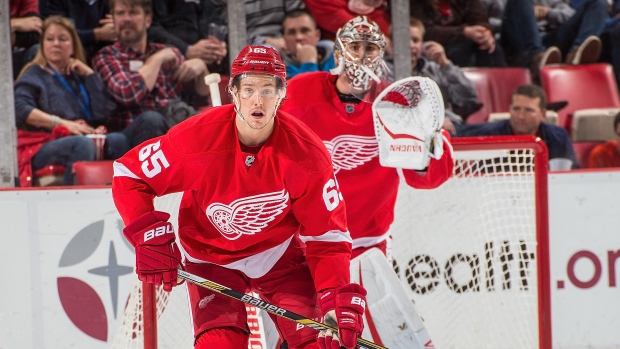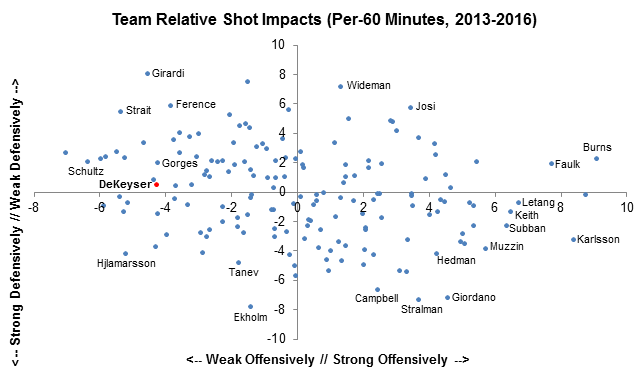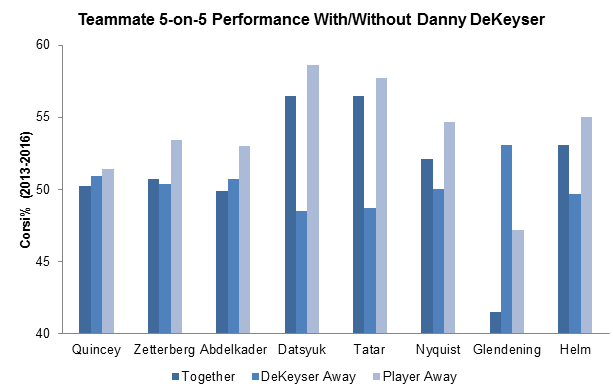Jul 28, 2016
Detroit made the wrong decision on DeKeyser
The Red Wings gave a big contract to a defenceman who has struggled to move the needle in any meaningful way, Travis Yost writes
By Travis Yost

One of the key decisions every general manager has to make is knowing when it makes sense to play hardball with a pending free agent and when it’s time to lock a player in on a long-term deal.
The Detroit Red Wings decided the latter was the optimal route with defenceman Danny DeKeyser, avoiding arbitration and securing the Western Michigan graduate to a six-year, $30-million deal this week.
I think they made the wrong choice.
Like many of my grievances with player valuations on the defensive side, I can’t reconcile the term or dollar amount of the contract with the DeKeyser we know – a defender who doesn’t belong on a first pairing and who has struggled to move the needle in any meaningful way since becoming a full-time player in the 2013-14 season.
DeKeyser is certainly an NHL talent. He’s been able to log big minutes at the highest professional level, chipped in occasionally on the scoring front, and despite the fact that his development is probably tapped (he turns 27 this season), there’s likely plenty of mileage left on his body.
But there’s plenty of reason to be skeptical about the value DeKeyser brings to the team and whether the Red Wings needed to commit to him on such a lengthy deal.
Below is a four-quadrant analysis of regular defencemen and their impact on team shot differentials over the last three seasons. The players in the top left have been relative drags on team performance on both the offensive and defensive ends of the ice. The players in the bottom right have been relative boosters of team performance on both the offensive and defensive ends of the ice.
Where does DeKeyser sit? Unfortunately, it’s the bad one.

DeKeyser is very middle-of-the-road when it comes to performance in the defensive zone – the Red Wings give up just as many shots against with DeKeyser on the ice as they do with him on the bench. Offensively, DeKeyser’s been a bit of a drag on things. In fact, of the 168-defenders you see here, he’s ranked 151st overall in relative shot for generation – the 11th percentile league-wide.
If you needed any corroborating evidence that this sort of stuff matters, just look at the names on the poles of each of the four quadrants. The top right features very offensively minded guys like Justin Faulk and Brent Burns. The bottom left features truly capable defensive defenders in guys like Niklas Hjalmarsson and Chris Tanev. The bottom right is basically Norris Trophy row – players who excel in all areas of the game and are regarded as some of the league’s finest talents.
We can dig deeper on the DeKeyser/teammate impact point, too. Instead of the macro-level analysis above, we can look at the situation on a player-by-player basis. As you might have guessed, DeKeyser’s teammates generally see their 5-on-5 shot numbers improve when they’re playing with other defenders. And considering Nicklas Lidstrom isn’t on one of the other pairings, this is rather concerning.

The one thing you don’t want to see on these with/without graphs is the ‘Player Away’ bar zooming away from performance numbers in other environments. When you see that manifest across many or all players you can start to reasonably infer that one player is dragging down the collective.
That’s ultimately what we see here with DeKeyser’s most common teammates. Outside of Luke Glendening, just about everyone sees the most favourable shot share when they are playing away from DeKeyser.
There are also instances where players have seemingly elevated DeKeyser’s shot share when playing together. Pavel Datsyuk, Tomas Tatar, Gustav Nyquist, and even Darren Helm have brought DeKeyser’s Corsi% well above the 50 per cent mark when playing together. But when DeKeyser is split away he sees his numbers drop below that break-even mark.
Ultimately, I’d be curious about how Detroit reconciles this against the contract they just gave DeKeyser. He’s going to be paid like a top-four defenceman for the next six years, even though he was infrequently that guy during his peak performance ages.
This contract seems awfully risky.

